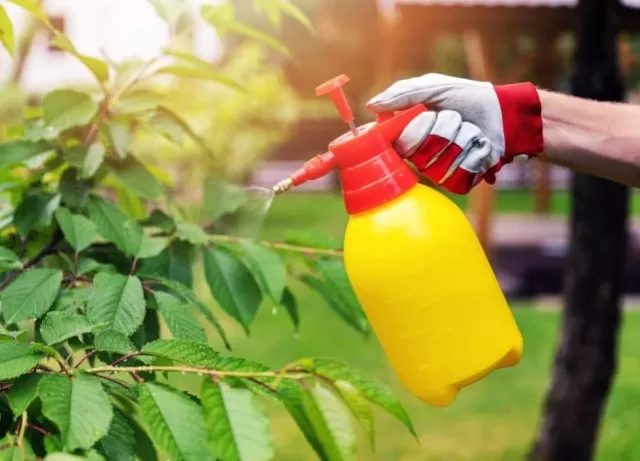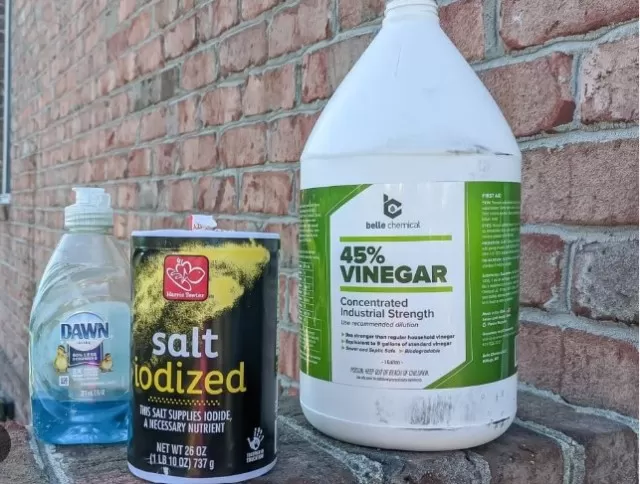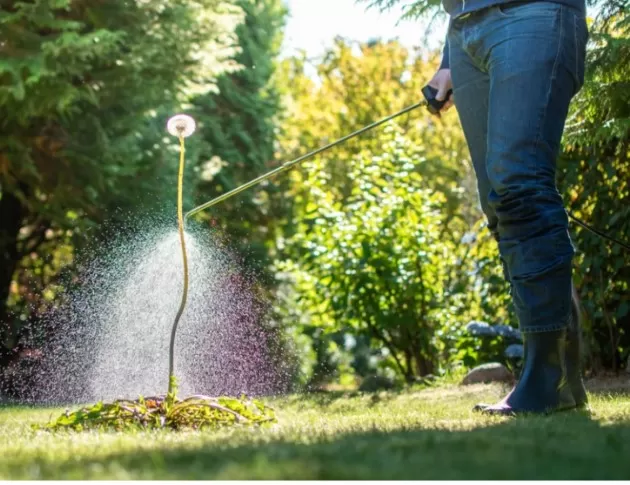This 3-Ingredient Vinegar Weed Killer: Garden-Safe Solution. Weeds are a common challenge for gardeners, but managing them doesn’t have to involve harsh chemicals. In fact, you likely have the ingredients for an organic solution right in your pantry, such as vinegar.
Eva Reutinger, a horticultural consultant, emphasizes the importance of using environmentally-friendly methods in your garden to avoid harmful effects on soil and water. Instead of reaching for chemical-based weed killers, consider making a homemade weed killer Using Vinegar, Dish Soap, and salt. This three-ingredient mixture provides an effective alternative while minimizing potential harm to your plants and the environment.
Unveiling the Weed-Fighting Power of Vinegar

Vinegar, a common household ingredient, can be a powerful ally in eliminating unwanted weeds from your garden.
Rebecca Sears, chief gardening guru at Seeds of Change, explains that vinegar’s acidity is the key factor in its weed-killing abilities. By breaking down cell walls and depriving weeds of moisture, vinegar effectively causes them to wither and perish.
With its readily available nature, kitchen vinegar, such as White Vinegar, can be harnessed as a natural herbicide, targeting weeds while sparing surrounding plants.
Vinegar, a common household ingredient, can be a powerful ally in eliminating unwanted weeds from your garden.
Rebecca Sears, chief gardening guru at Seeds of Change, explains that vinegar’s acidity is the key factor in its weed-killing abilities. By breaking down cell walls and depriving weeds of moisture, vinegar effectively causes them to wither and perish.
With its readily available nature, kitchen vinegar, such as white vinegar, can be harnessed as a natural herbicide, targeting weeds while sparing surrounding plants.
DIY Recipe: Effective Homemade Weed Killer with Vinegar

Tired of battling stubborn weeds in your garden? Look no further than a homemade weed killer concocted with vinegar, dish soap, and salt.
This simple yet effective solution can help you eliminate unwanted plant growth without resorting to harsh chemicals. By harnessing the power of vinegar’s acidity and combining it with the properties of dish soap and salt, you can create a natural weed killer that targets and destroys pesky weeds.
Ingredients and Preparation: To make your own 3-ingredient homemade weed killer, gather the following:.
1 cup of salt
1 tablespoon of dish soap
1 gallon of white vinegar
In a container, mix the salt, dish soap, and vinegar thoroughly until well combined.
Blythe Yost, CEO and co-founder of Tilly, suggests using white vinegar due to its colorless nature and affordability. The salt and vinegar work in tandem to dissolve the plant’s cell walls, while the dish soap aids in coating the weed leaves effectively.
It’s important to note that some vinegar variants may have higher acidity, which can enhance effectiveness. However, always prioritize safety and wear eye and hand protection when handling the mixture.
Application and Precautions: When applying the homemade weed killer, wearing gloves, long pants, and sleeves is crucial to protect your skin from any potential irritation.
As Rebecca Sears advises, exercise caution and avoid contact with eyes and face. Additionally, choose a calm, non-windy day to prevent the mixture from blowing onto yourself or desirable plants.
Creating your own weed killer using vinegar, dish soap, and salt provides a natural and cost-effective solution to combat unwanted weeds in your garden.
By following the simple recipe and taking necessary precautions, you can effectively dissolve weed cell walls and minimize their growth. Embrace the power of this homemade weed killer and reclaim your garden from pesky intruders while promoting a safer and eco-friendly approach to weed control.
Effective Weed Management Strategies for Long-Term Results

While vinegar weed killer can be a useful tool in your weed management arsenal, it is important to approach weed control from a multifaceted perspective.
By combining various methods, such as manual pulling, organic herbicides, and strategic plantings, you can achieve long-term success in keeping weeds at bay. Additionally, incorporating practices like using natural mulch and maintaining a healthy garden will naturally discourage weed growth.
While vinegar weed killer has its benefits, it should not be solely relied upon for comprehensive weed management.
Implementing a Multifaceted Approach: According to Eva Reutinger, a combination of strategies is key to effective weed control.
Alongside using vinegar weed killer, she recommends manual pulling of weeds, incorporating organic herbicides, and strategic planting choices. Planting ground covers, applying mulch, and maintaining the overall health of your plants are effective measures that naturally limit weed growth and reduce the need for constant intervention.
Using Vinegar Wisely: While vinegar weed killer can be effective, it should not be used excessively.
Rebecca Sears advises against continuous application, as vinegar’s acidic nature can impact beneficial microbes in the soil. Instead, Sears suggests using natural mulch, such as pine needles or grass clippings, to prevent weed growth.
Vinegar is most effective on smaller, shallow-rooted weeds and may be less effective on resilient, deep-rooted weeds like crabgrass.
The Power of Manual Weed Removal: For organic and safe weed control, Blythe Yost emphasizes the importance of manual weed removal.
Using your hands or a weed trowel to pull weeds is a highly effective method, especially for targeted removal of specific weeds. This approach allows for precise weed control without the use of any products, promoting a more sustainable gardening practice.
While vinegar weed killer can be a valuable tool, it is essential to adopt a multifaceted approach to weed management.
By combining manual weed pulling, organic herbicides, and strategic planting choices, along with the use of vinegar weed killer, you can achieve long-term success in keeping weeds under control. Additionally, promoting a healthy garden environment through natural mulch and maintaining plant health will further deter weed growth.
Remember, the best way to organically and safely control weeds is to manually remove them, ensuring a thriving and weed-free garden.
*The information is for reference only.